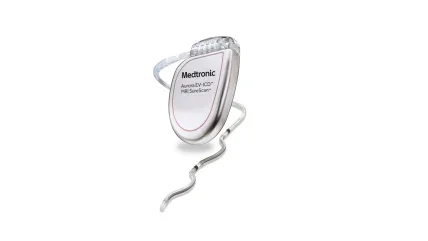
Healthcare technology firm Medtronic has presented positive long-term results from the global Extravascular Implantable Cardioverter Defibrillator (EV ICD) trial of its Aurora EV-ICD system.
The Medtronic EV ICD system is an implantable defibrillator designed to mitigate certain risks associated with traditional transvenous implantable cardioverter-defibrillators (ICDs).
Its lead is positioned outside the heart and veins, beneath the breastbone using a minimally invasive approach.
The system provides anti-tachycardia pacing (ATP) and pause prevention pacing, and it is similar in size, shape, and battery life to traditional transvenous ICDs.
The Aurora EV-ICD secured CE Mark and US Food and Drug Administration (FDA) approval in 2023.
The EV ICD trial is a prospective, multicentre, single-arm, non-randomised pre-market clinical study.
It was designed to evaluate the safety and effectiveness of the Medtronic EV-ICD system for patients at risk of sudden cardiac death. The study involved 356 patients across 46 sites in 17 countries.
The primary results, published in The New England Journal of Medicine, confirmed that previously reported safety and effectiveness findings were maintained for up to 18 months.
According to the final results analysis, ATP succeeded in 37 out of 48 episodes (77%), comparable to the success rates of transvenous ATP.
The EV-ICD system effectively terminated ventricular tachycardia (VT) and ventricular fibrillation (VF). It achieved a 100% success rate for shocks in discrete spontaneous episodes.
ATP usage increased significantly throughout the study follow-up, averaging 30.6 months.
Additionally, the EV-ICD exhibited a low rate of major complications and a high success rate for delivering appropriate therapy, with ATP preventing the need for shocks in nearly half of the episodes.
Medtronic also reported favourable patient-reported quality of life (QOL) metrics and high patient acceptance of the device.
Patients with EV-ICD experienced fewer concerns about body image and less device-related distress from baseline through the six-month follow-up period.
Medtronic cardiovascular portfolio cardiac rhythm management business chief medical officer Alan Cheng said: “These findings highlight our commitment to continuing to create innovative products that allow physicians to provide device therapy with the advantages of transvenous defibrillators, while remaining outside the heart and vascular space.”
Medtronic is also conducting the Enlighten Study for the Aurora EV-ICD system, spanning over 125 sites.
The healthcare technology company recently divested its cardiac workflow solution, Paceart Optima system, to PaceMate, a remote cardiac data management firm.






